unit 1 Great scientists reading课件(28ppt)
文档属性
| 名称 | unit 1 Great scientists reading课件(28ppt) | 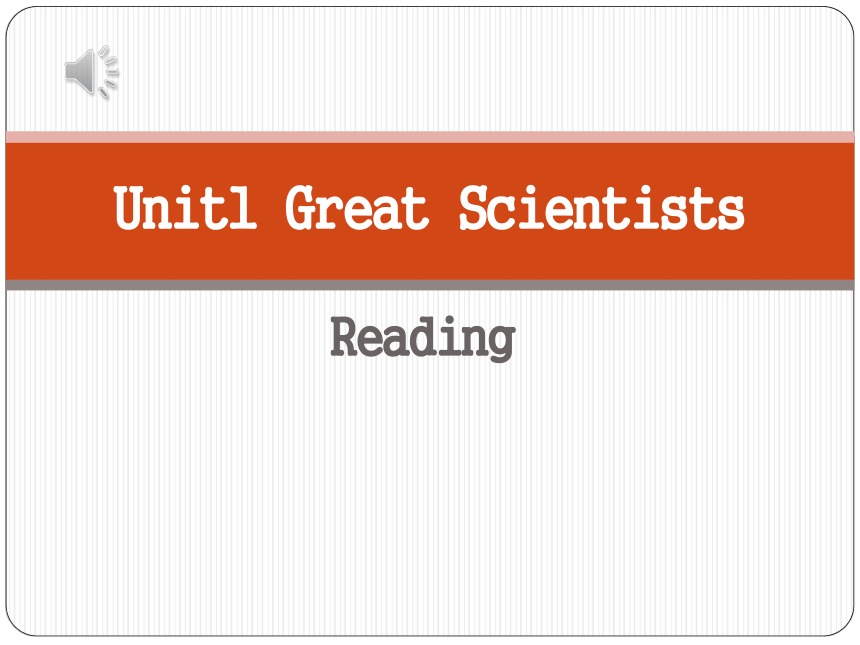 | |
| 格式 | zip | ||
| 文件大小 | 3.7MB | ||
| 资源类型 | 教案 | ||
| 版本资源 | 人教版(新课程标准) | ||
| 科目 | 英语 | ||
| 更新时间 | 2016-12-08 18:39:56 | ||
图片预览


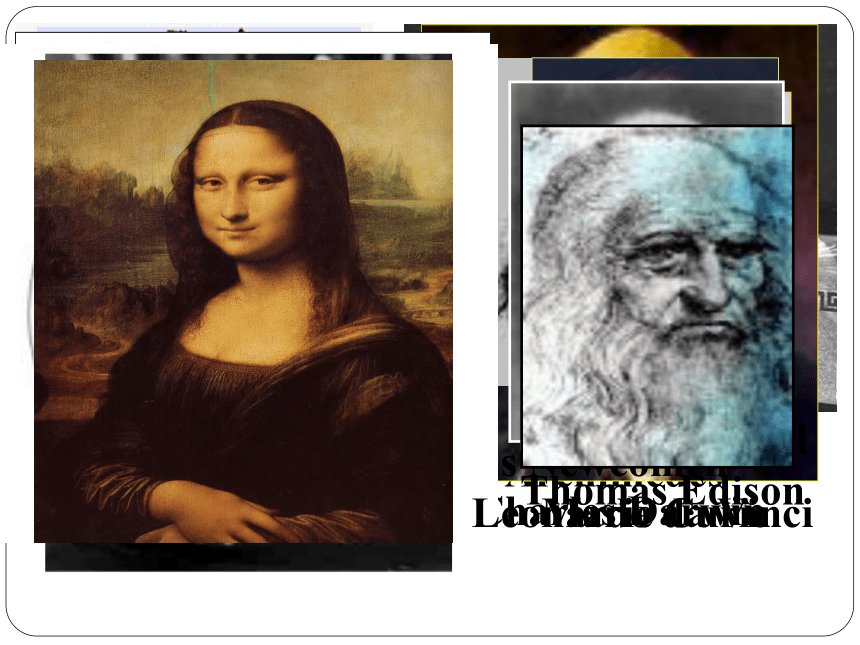


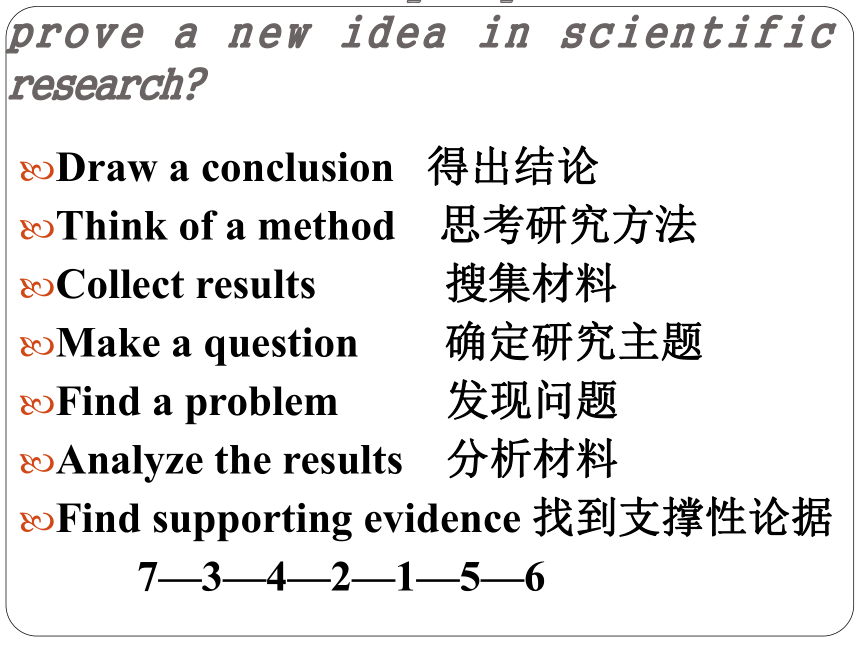
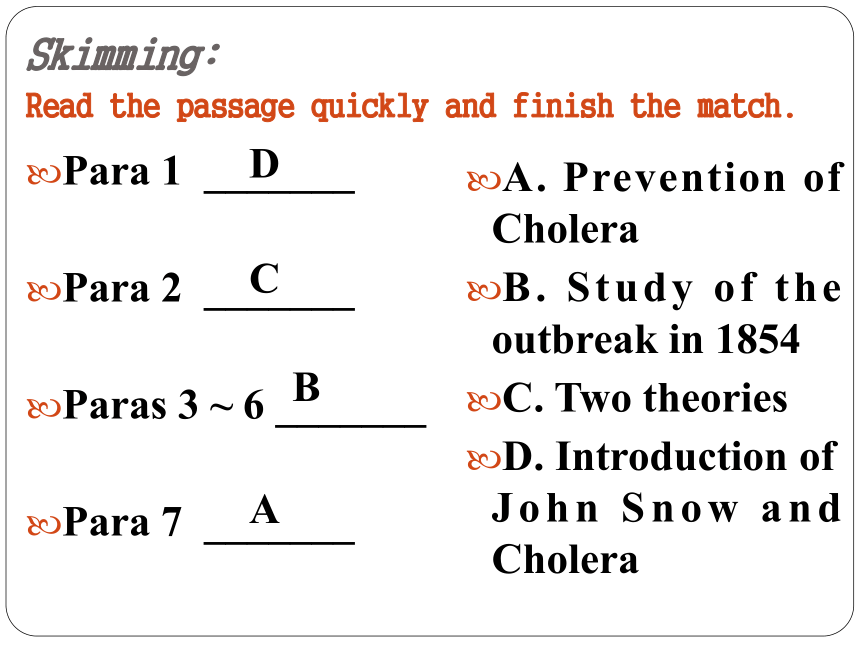
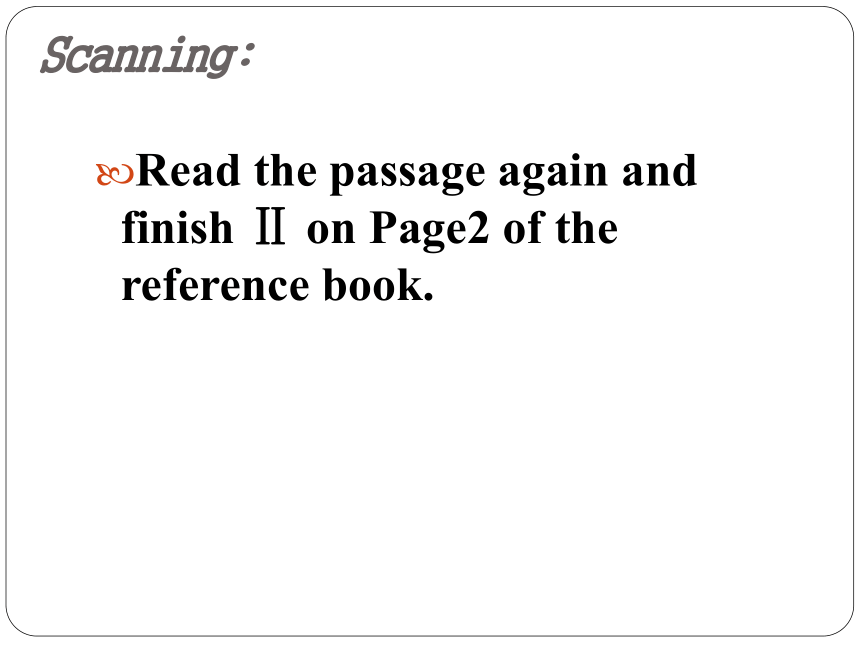
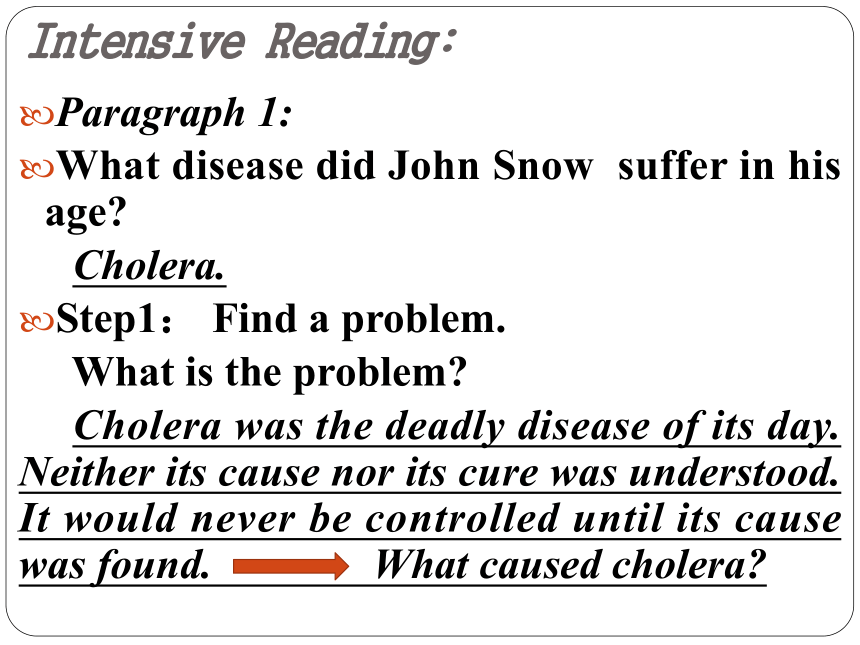
文档简介
课件28张PPT。ReadingUnit1 Great Scientists Warming-up
Pre-reading
While-reading
Post-readingBuoyancyArchimedesCharles DarwinThomas NewcomenGregor MendelMarie CurieThomas EdisonLeonardo da VinciseismographZhang HengStephen HawkingLeading-in:What do you know about infectious diseases?
Diseases that are easily passed from one person to another.
AIDS 艾滋病(Acquired Immune Deficiency Syndrome获得性免疫综合症)
SARS (Severe Acute Respiratory Syndrome严重性急性呼吸道综合症)
Cholera 霍乱病 (a disease caught from infected water that causes severe diarrhea and vomiting and often causes death)What order would you put them in to prove a new idea in scientific research?Draw a conclusion 得出结论
Think of a method 思考研究方法
Collect results 搜集材料
Make a question 确定研究主题
Find a problem 发现问题
Analyze the results 分析材料
Find supporting evidence 找到支撑性论据
7—3—4—2—1—5—6
Skimming:Read the passage quickly and finish the match. Para 1 _______
Para 2 _______
Paras 3 ~ 6 _______
Para 7 _______
A. Prevention of Cholera
B. Study of the outbreak in 1854
C. Two theories
D. Introduction of John Snow and CholeraDCABScanning:Read the passage again and finish Ⅱ on Page2 of the reference book.Intensive Reading:Paragraph 1:
What disease did John Snow suffer in his age?
Cholera.
Step1: Find a problem.
What is the problem?
Cholera was the deadly disease of its day. Neither its cause nor its cure was understood. It would never be controlled until its cause was found. What caused cholera? John Snow was a famous doctor in London—so expert , indeed, that he attended Queen Victoria as her personal physician.
约翰.斯诺是伦敦一位著名的医生—他的确医术精湛,因而成为照料维多利亚女王的私人医生。
so + adj./adv. +that 如此…以至于(结果)
so that= in order that 以便 (目的)
so/such…that用于句首加强语气时,主句谓语要用部分倒装。 (so/neither/nor) But he became inspired when he thought about helping ordinary people exposed to cholera.
他一想到要帮助那些得了霍乱的普通百姓时,他就感到很振奋。
exposed to 过去分词作后置定语
expose sb. to sth. 使某人接触/体验
This was the deadly disease of its day.
霍乱在当时是致命的疾病。
deadly adj. ①致命的;
deadly weapon 致命武器
②极度的;十足的;
We sat in deadly silence. 我们默不作声地坐着。
adv. ①极其;非常
deadly serious 极其严肃
②deathly 死一般地
deadly pale 死一般地苍白
Neither its cause nor its cure was understood.
人们既不知道它的病源,也不了解它的治疗方法。
neither… nor… 既不…也不…
主谓一致:毗邻一致(就近原则)
Neither he nor I _______ to blame.
我和他都不该受责备。
同: either…or; not only…but also…; or…
位于句首,句子语序:部分倒装
am So many thousands of terrified people died every time there was an outbreak.
每次霍乱暴发时,就有大批惊恐的老百姓死去。
every time 可作连词,引导时间状语从句;表示“每次;每当”。
名词词组:the moment/each time/the minute/the first time/next time
副词:immediately/directly/instantly (=as soon as)
Paragraph 2:What’s the topic of this paragraph?
Two theories.
Theory 1: Cholera multiplied in the air.
Theory 2: People absorbed cholera into their bodies with their meals.
Step 2: Make a question.
Which theory was right? The first suggested that cholera multiplied in the air. A cloud of gas floated around until it found its victims.
一种推测是霍乱病毒在空气中迅速增加,像一股危险的气体到处漂浮。
multiply v. 大量增加;繁殖;乘
Two multiplied by three is/equals six.
2*3=6.
a hive of bees 一群蜜蜂
a shoal of fish 一群鱼 The second suggested that people absorbed this disease into their bodies with their meals. From the stomach the disease quickly attacked the body and soon the affected person died.
第二种推测是人们在吃饭的时候把这种病毒引入体内的。病从胃里发作而迅速殃及全身,患者就会很快地死去。
suggest vt. 表明;建议
suggest doing 建议做…
suggest that sb. (should) do sth. 建议 His smile suggested that he _________ (be) satisfied.
The doctor suggested that he _______ (keep) a balanced diet.
affect vt. 影响;使感染;深深打动;
区别:effect
waskeepParagraph 3How serious was the disease outbreak in 1854?
The cholera was so severe that more than 500 people died in ten days.
Step 3: Think of a method
Gather information—collect data on those who fell ill or died and where they lived.
John Snow suspected that the second theory was correct but he needed evidence.
约翰.斯诺推测第二种说法是正确的,但他需要证据。
suspect vt.怀疑;觉察
suspect sb./sth. to be 怀疑某人是
suspect sb./sth. of doing sth. 怀疑某人做…
The drug is suspected of causing 200 deaths.
人们怀疑这种药物造成200多人死亡。 adj. 不可信的;靠不住的;可疑的(=suspicious)
suspicious adj. 怀疑的,感觉可疑的;可疑的,令人怀疑的
suspicious of/about sb./sth. 怀疑…;觉得…可疑
They became suspicious of his behavior and contacted the police.
他们觉得他的行为可疑,便报了警。 So when another outbreak hit London in 1854, he was ready to begin his enquiry.
因此,在1854年伦敦再次暴发霍乱的时候,约翰.斯诺就开始收集资料。
NAmE: inquiry
enquire/inquire 询问;打听;调查
inquire about/as to sth. 查询;打听
I called the station to inquire about train times. 我打电话到车站询问火车时刻。
inquire into sth. 调查某事
Paragraph 4:Do you think John Snow would have solved this problem without the map? Give a reason.
No, the map gave him a valuable clue about the cause of the disease—making him identify the number of deaths in different streets and leading him to find out the polluted water in the pump being to blame.
Step 4: Collect results
Plot information on a map to find out where people died or did not died.
Paragraph 5:
What did John Snow advise people in Broad Street do? What ‘s the result?
He told them to remove the handle from the handle from the pump so that it could not be used. The disease slowed down. Step 5: Analyze results
Look into the source of the water and analyze whether the water is the cause of the death.
Paragraph6:
Step 6: Find supporting evidence
A woman and her daughter died of cholera after drinking the water.
Step 7: Draw a conclusion
It was certain that polluted water carried the germ.
The water companies were instructed not to expose people to polluted water any more.
自来水公司也接到指令,不能再让人们接触被污染的水了。 instruct v. 指示,命令
instruct sb. to do sth. 指示某人做…
instruct sb. in sth. 教授,传授(技能)
All our staff have been instructed in sign language.
我们的员工都接受过手语培训。
instructions 说明书;操作指南
descriptions/directionsPost-Reading:Finish the exercises in the workbook.
Pre-reading
While-reading
Post-readingBuoyancyArchimedesCharles DarwinThomas NewcomenGregor MendelMarie CurieThomas EdisonLeonardo da VinciseismographZhang HengStephen HawkingLeading-in:What do you know about infectious diseases?
Diseases that are easily passed from one person to another.
AIDS 艾滋病(Acquired Immune Deficiency Syndrome获得性免疫综合症)
SARS (Severe Acute Respiratory Syndrome严重性急性呼吸道综合症)
Cholera 霍乱病 (a disease caught from infected water that causes severe diarrhea and vomiting and often causes death)What order would you put them in to prove a new idea in scientific research?Draw a conclusion 得出结论
Think of a method 思考研究方法
Collect results 搜集材料
Make a question 确定研究主题
Find a problem 发现问题
Analyze the results 分析材料
Find supporting evidence 找到支撑性论据
7—3—4—2—1—5—6
Skimming:Read the passage quickly and finish the match. Para 1 _______
Para 2 _______
Paras 3 ~ 6 _______
Para 7 _______
A. Prevention of Cholera
B. Study of the outbreak in 1854
C. Two theories
D. Introduction of John Snow and CholeraDCABScanning:Read the passage again and finish Ⅱ on Page2 of the reference book.Intensive Reading:Paragraph 1:
What disease did John Snow suffer in his age?
Cholera.
Step1: Find a problem.
What is the problem?
Cholera was the deadly disease of its day. Neither its cause nor its cure was understood. It would never be controlled until its cause was found. What caused cholera? John Snow was a famous doctor in London—so expert , indeed, that he attended Queen Victoria as her personal physician.
约翰.斯诺是伦敦一位著名的医生—他的确医术精湛,因而成为照料维多利亚女王的私人医生。
so + adj./adv. +that 如此…以至于(结果)
so that= in order that 以便 (目的)
so/such…that用于句首加强语气时,主句谓语要用部分倒装。 (so/neither/nor) But he became inspired when he thought about helping ordinary people exposed to cholera.
他一想到要帮助那些得了霍乱的普通百姓时,他就感到很振奋。
exposed to 过去分词作后置定语
expose sb. to sth. 使某人接触/体验
This was the deadly disease of its day.
霍乱在当时是致命的疾病。
deadly adj. ①致命的;
deadly weapon 致命武器
②极度的;十足的;
We sat in deadly silence. 我们默不作声地坐着。
adv. ①极其;非常
deadly serious 极其严肃
②deathly 死一般地
deadly pale 死一般地苍白
Neither its cause nor its cure was understood.
人们既不知道它的病源,也不了解它的治疗方法。
neither… nor… 既不…也不…
主谓一致:毗邻一致(就近原则)
Neither he nor I _______ to blame.
我和他都不该受责备。
同: either…or; not only…but also…; or…
位于句首,句子语序:部分倒装
am So many thousands of terrified people died every time there was an outbreak.
每次霍乱暴发时,就有大批惊恐的老百姓死去。
every time 可作连词,引导时间状语从句;表示“每次;每当”。
名词词组:the moment/each time/the minute/the first time/next time
副词:immediately/directly/instantly (=as soon as)
Paragraph 2:What’s the topic of this paragraph?
Two theories.
Theory 1: Cholera multiplied in the air.
Theory 2: People absorbed cholera into their bodies with their meals.
Step 2: Make a question.
Which theory was right? The first suggested that cholera multiplied in the air. A cloud of gas floated around until it found its victims.
一种推测是霍乱病毒在空气中迅速增加,像一股危险的气体到处漂浮。
multiply v. 大量增加;繁殖;乘
Two multiplied by three is/equals six.
2*3=6.
a hive of bees 一群蜜蜂
a shoal of fish 一群鱼 The second suggested that people absorbed this disease into their bodies with their meals. From the stomach the disease quickly attacked the body and soon the affected person died.
第二种推测是人们在吃饭的时候把这种病毒引入体内的。病从胃里发作而迅速殃及全身,患者就会很快地死去。
suggest vt. 表明;建议
suggest doing 建议做…
suggest that sb. (should) do sth. 建议 His smile suggested that he _________ (be) satisfied.
The doctor suggested that he _______ (keep) a balanced diet.
affect vt. 影响;使感染;深深打动;
区别:effect
waskeepParagraph 3How serious was the disease outbreak in 1854?
The cholera was so severe that more than 500 people died in ten days.
Step 3: Think of a method
Gather information—collect data on those who fell ill or died and where they lived.
John Snow suspected that the second theory was correct but he needed evidence.
约翰.斯诺推测第二种说法是正确的,但他需要证据。
suspect vt.怀疑;觉察
suspect sb./sth. to be 怀疑某人是
suspect sb./sth. of doing sth. 怀疑某人做…
The drug is suspected of causing 200 deaths.
人们怀疑这种药物造成200多人死亡。 adj. 不可信的;靠不住的;可疑的(=suspicious)
suspicious adj. 怀疑的,感觉可疑的;可疑的,令人怀疑的
suspicious of/about sb./sth. 怀疑…;觉得…可疑
They became suspicious of his behavior and contacted the police.
他们觉得他的行为可疑,便报了警。 So when another outbreak hit London in 1854, he was ready to begin his enquiry.
因此,在1854年伦敦再次暴发霍乱的时候,约翰.斯诺就开始收集资料。
NAmE: inquiry
enquire/inquire 询问;打听;调查
inquire about/as to sth. 查询;打听
I called the station to inquire about train times. 我打电话到车站询问火车时刻。
inquire into sth. 调查某事
Paragraph 4:Do you think John Snow would have solved this problem without the map? Give a reason.
No, the map gave him a valuable clue about the cause of the disease—making him identify the number of deaths in different streets and leading him to find out the polluted water in the pump being to blame.
Step 4: Collect results
Plot information on a map to find out where people died or did not died.
Paragraph 5:
What did John Snow advise people in Broad Street do? What ‘s the result?
He told them to remove the handle from the handle from the pump so that it could not be used. The disease slowed down. Step 5: Analyze results
Look into the source of the water and analyze whether the water is the cause of the death.
Paragraph6:
Step 6: Find supporting evidence
A woman and her daughter died of cholera after drinking the water.
Step 7: Draw a conclusion
It was certain that polluted water carried the germ.
The water companies were instructed not to expose people to polluted water any more.
自来水公司也接到指令,不能再让人们接触被污染的水了。 instruct v. 指示,命令
instruct sb. to do sth. 指示某人做…
instruct sb. in sth. 教授,传授(技能)
All our staff have been instructed in sign language.
我们的员工都接受过手语培训。
instructions 说明书;操作指南
descriptions/directionsPost-Reading:Finish the exercises in the workbook.
